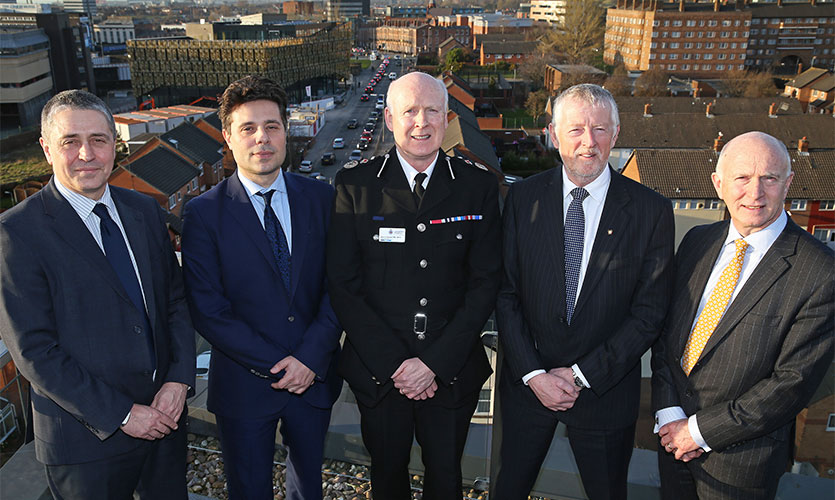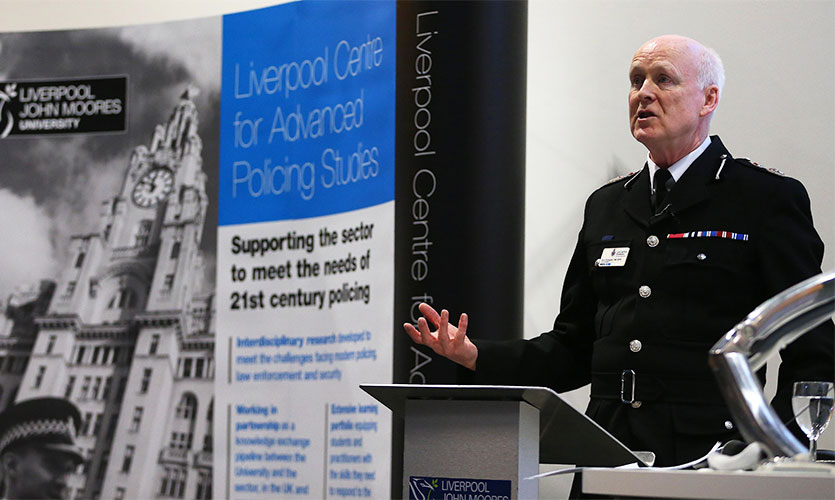Policing and adapting to the changing nature of demand
Modern policing is facing the double challenge of austerity on one side and changing demand for services on the other, with the two elements in danger of colliding.
That was the view of Chief Constable of Lancashire Steve Finnigan CBE QPM, one of Britain’s most senior police officers, on his visit to LJMU to give a lecture on The Changing Nature of Demand – What is it the police do today, and what should they be doing.
The lecture was organised by the Liverpool Centre for Advanced Policing Studies at Liverpool John Moores University.
The event was introduced by Sir Jon Murphy QPM, Professor of Policing Studies at LJMU, who was Chief Con Finnigan’s predecessor at the Lancashire force. He spoke warmly in his introduction about their experiences working together as young officers and praised Chief Con Finnigan’s “stellar police career”.
The Queen’s Police Medal recipient, who joined Merseyside Police in 1976, then took to the podium to tell the Redmonds Building audience about how less visible and higher risk crimes are now stretching police services more than traditional crime. He detailed how police forces must adapt in order to deal with modern crimes such as cybercrime, child pornography and terrorism.
He said: “Cybercrime has evolved more than any other, whether it’s indecent images of children, fraud or harassment. Every investigation now has a digital element that will involve the interrogation of devices and financial investigations “Due to these increasing demands, our officers and police staff must be up-skilled so that they are able to investigate incidences and crimes in the 21st century.”
Police forces, alongside other public services, have faced major cuts since 2010 due to far reaching austerity policies. This has made the policing of modern demands considerably more difficult.
He spoke of the serious effects cuts to police budgets have had on the Lancashire Constabulary and the wider nation, adding: “We have lost £75m from our budget since 2010. Nationally, the police budget has been cut by about £2.3bn and we have lost about 46,000 people, which includes over 20,000 police officers.
“The depth and speed of cuts have put into doubt the sustainability of our cherished model of policing, which is a very proactive and preventative approach. We do not want to have to move to a more reactive model. To avoid that we have to be innovative and creative if we are to prevent our diminishing capacity translating into reduced capability.”
The highly-informed audience did not hold back in the question and answer session. The Chief Constable was asked to respond to worries regarding how many of the policing priorities detailed in the lecture, aimed at targeting female genital mutilation, honour killing, modern slavery and terrorism, could lead to the discrimination of certain ethnic and religious groups.
He responded that policies would not be directed at certain communities but also discussed how to deal with incidences committed within diverse groups.
He said: “We must get close to our diverse communities. If we feel we must go into these communities to address relevant issues, the more we can get the support from these groups to deal with offences, the stronger we will be. This unfortunately will be difficult going forward as police are very thin on the ground.”




